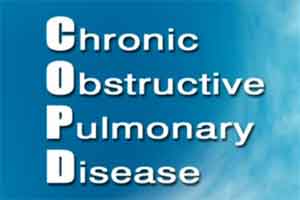- Home
- Editorial
- News
- Practice Guidelines
- Anesthesiology Guidelines
- Cancer Guidelines
- Cardiac Sciences Guidelines
- Critical Care Guidelines
- Dentistry Guidelines
- Dermatology Guidelines
- Diabetes and Endo Guidelines
- Diagnostics Guidelines
- ENT Guidelines
- Featured Practice Guidelines
- Gastroenterology Guidelines
- Geriatrics Guidelines
- Medicine Guidelines
- Nephrology Guidelines
- Neurosciences Guidelines
- Obs and Gynae Guidelines
- Ophthalmology Guidelines
- Orthopaedics Guidelines
- Paediatrics Guidelines
- Psychiatry Guidelines
- Pulmonology Guidelines
- Radiology Guidelines
- Surgery Guidelines
- Urology Guidelines
Don't over prescribe antibiotics for COPD , directs NICE

A COPD flare-up or exacerbation happens when COPD symptoms get worse, or when new symptoms develop. This is the biggest reason of disability and hospitalisation among COPD patients. New NICE Guidelines warn Healthcare professionals against indiscriminate use of antibiotics and advise them to consider the risk of antimicrobial resistance while prescribing antibiotics for treating or preventing a flare-up of symptoms of chronic obstructive pulmonary disease (COPD).
According to WHO, Chronic obstructive pulmonary disease (COPD) is a progressive lifethreatening lung disease that causes breathlessness (initially with exertion) and predisposes to exacerbations and serious illness.The Global Burden of Disease Study reports a prevalence of 251 million cases of COPD globally in 2016. It is estimated that 3.17 million deaths were caused by the disease in 2015 (that is, 5% of all deaths globally in that year).
These new recommendations come as NICE publishes antimicrobial prescribing guidance (APG)
The antimicrobial guidance recommends that
- Antibiotics should be offered only to people who have a severe flare-up of symptoms, also known as a severe acute exacerbation.
- Other factors should be taken into account when considering the use of antibiotics for treating an acute exacerbation that is not severe, such as the number and severity of symptoms.
- Acute exacerbations of COPD can be caused by a range of factors including viral infections and smoking. Only around half are caused by bacterial infections, so many exacerbations will not respond to antibiotics.
Paul Chrisp, director of the centre for guidelines at NICE, said: “Evidence shows that there are limited benefits of using antibiotics for managing acute exacerbations of COPD and that it is important to take other options into account before antibiotics are prescribed.
"These recommendations will help healthcare professionals to make responsible prescribing decisions, which will not only help people manage their condition but also reduce the risk of antimicrobial resistance.”
The other clinical guideline update, published today, states when to use antibiotics to prevent exacerbations happening in the first place (antibiotic prophylaxis). It recommends that antibiotics used in this way should only be offered to people who are most likely to benefit from them.
Dr Andrew Molyneux, chair of the COPD update committee, said: “COPD is a common and life-threatening illness, causing 115,000 admissions to hospitals every year. For some people who have frequent exacerbations, prophylactic antibiotics can help to reduce the frequency of exacerbations and admissions to hospital. However, the benefits of prophylactic antibiotics need to be balanced against the potential for more antibiotic resistance.”
Warning signs and symptoms of a COPD flare-up:
- An unusual increase in shortness of breath
- Mucus (phlegm) that is more yellow, green or brown than usual
- An increase in the amount, thickness or stickiness of your mucus (phlegm)
- Fever
- Symptoms of a cold, such as a headache, runny nose, or a sore throat
- Swollen ankles
- Feeling tired and generally unwell
Antibiotics are a life-saving option for exacerbation of COPD but prescriber needs to strike a delicate balance between the requirement and overprescription so that one can ward off antibiotic resistance.

Disclaimer: This site is primarily intended for healthcare professionals. Any content/information on this website does not replace the advice of medical and/or health professionals and should not be construed as medical/diagnostic advice/endorsement or prescription. Use of this site is subject to our terms of use, privacy policy, advertisement policy. © 2020 Minerva Medical Treatment Pvt Ltd